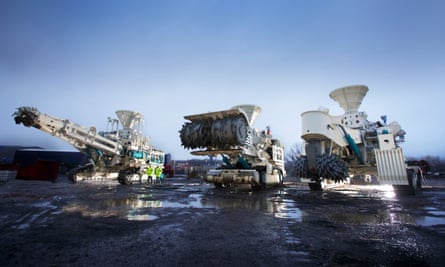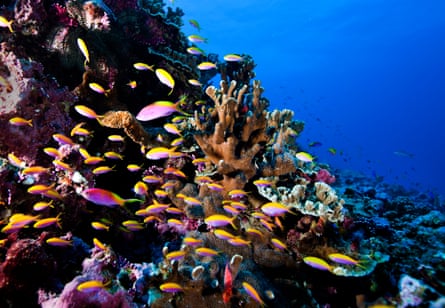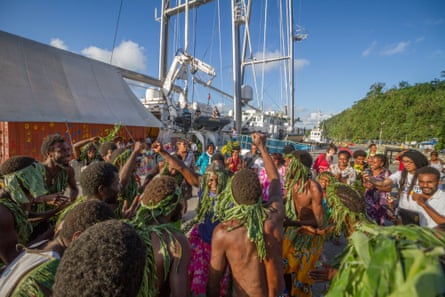Private mining firms and arms companies are exerting a hidden and unhealthy influence on the fate of the deep-sea bed, according to a new report highlighting the threats facing the world’s biggest intact ecosystem.
An investigation by Greenpeace found a handful of corporations in Europe and North America are increasingly dominating exploration contracts, and have at times taken the place of government representatives at meetings of the oversight body, the UN’s International Seabed Authority (ISA).
Greenpeace said this undermines effective environmental management and fair distribution of risks and rewards from the ocean floor, which some states and companies want to open up for exploitation next year.
Given the potential risks of fisheries disturbance, water contamination, sound pollution and habitat destruction for dumbo octopuses, sea pangolins and other species, the campaign group said no new licences should be approved. It has said governments should instead implement an ocean treaty, to ensure adequate protections.

Mining firms see the deep-sea bed as the last frontier for a mineral extraction boom. Technological hurdles have been overcome, and the ISA’s recently re-appointed secretary-general Michael Lodge – from the UK – wants member states to agree on a rulebook next year that would set standards for working practices and allow commercial mining to begin.
The new Greenpeace report, released on Wednesday, suggests this would be premature, because the industry is secretive and inadequately regulated. Among its findings are:
-
Deep sea mining is deeply destructive. Excavation of mineral nodes, for example, is done by giant tractors that chew through the sea bed
-
The oversight organisation, ISA, has no environmental or scientific assessment group. Instead, applications are vetted by a legal and technical commission, which is dominated by lawyers and geologists. Only three of the 30 members of the commission are biologists or environmental specialists
-
ISA has not rejected any of the 30 exploration applications it has received. It has potential conflict of interest because it receives $500,000 (GBP374,000) for each licence
-
Seabed resources are supposed to benefit all of humanity and promote sustainable development, but just three companies from wealthy nations have a hand in eight of the nine contracts to explore for minerals in the Pacific Clarion-Clipperton zone that have been awarded since 2010: Canadian-registered DeepGreen, Belgian corporate Dredging Environmental and Marine Engineering NV (Deme), and a UK-based subsidiary of the US arms manufacturer Lockheed Martin
-
The role of these companies is opaque. None of these parent companies are listed by the ISA in its list of contractors. Many operate through subsidiaries or by taking shares in partners in small island states, often in conjunction with national governments. This leads to concerns about accountability in the event of an accident – the subsidiaries are often small, which could leave poor nations with huge liabilities
-
Corporate influence on some governments is so great at ISA that DeepGreen executives temporarily stood in for Nauru delegates in a February 2019 session of the ISA council, where Deme executives also spoke on behalf of Belgium
-
Ties between the UK government and the industry have also been unhealthily cosy. Cabinet-office officials have worked for Lockheed Martin after retirement. Former prime minister David Cameron used Lockheed Martin estimates of the potential value of the deep-sea mining industry, rather than independent analysis

The dangers of this system were apparent in 2019, when the deep-sea mining firm Nautilus went bankrupt, leaving its partner state, Papua New Guinea, with substantial clean-up losses. Papua New Guinea is now among a growing number of nations calling for a moratorium on the industry, along with conservationists including David Attenborough and Chris Packham.
But exploration permits for the international seabed already cover an area equivalent in size to France and Germany combined, and that area is likely to expand rapidly, despite the risks to biodiversity and ocean carbon deposits.
Greenpeace said the biggest problem was the lack of transparency and oversight. “We need to shine a light on the industry at this gold-rush moment because most people don’t realise this is going on,” said the report’s author, Louisa Casson, from the Protect the Oceans campaign.
Rather than open up a whole new field of resource extraction, nations should focus more on reusing and recycling existing supplies of minerals, she said.
“We think the deep sea ocean should be off limits because it not possible to have good enough environmental rules, especially now that scientists are warning of irreversible harm and potential extinctions. The ISA is supposed to be protecting the oceans and it’s not doing its job.”

In a response to Greenpeace, DeepGreen Metals Inc said deep sea mining could supply “critical minerals for the global transition off fossil fuels at a fraction of environmental and social costs associated with metal production from conventional land ores”.
It added: “Without investment in this industry from private sector companies such as ours, Pacific island nations like Nauru, Kiribati and the Kingdom of Tonga would not otherwise have an opportunity to participate in the benefits of this new resource opportunity to diversify and develop their economies. Until recently, deep-sea exploration was carried out only by the rich industrialised countries, further increasing the potential for global wealth disparity.”
Peter Ruddock, director of UK Seabed Resources Ltd and chief executive of Lockheed Martin UK, said in a statement to Greenpeace: “UK Seabed Resources has been, and continues to be, entirely transparent with Greenpeace, the wider NGO and stakeholder community, the International Seabed Authority (ISA), and the public, about its structure and relationships with the UK government and Ocean Minerals Singapore (OMS), and indeed all our partners and stakeholders.
“Seabed minerals have a potentially critical role to play in the decarbonisation of the planet by providing a vital and reliable alternative source of critical minerals for, among other things, clean energy including battery technologies. We intend to continue to work towards the realisation of this potential opportunity with our valued stakeholders and partners.”
In a letter to Greenpeace, Deme said: “20 countries are now actively engaged in deep-sea mining exploration. All have an interest in a clear and settled regulatory regime to govern exploitation, as indeed does humankind as a whole.”